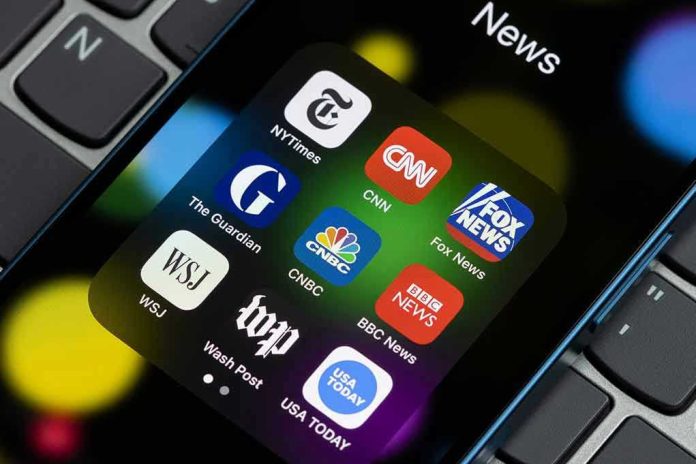
President Trump is threatening to sue the BBC for $1 billion over a live broadcast isn’t just another media skirmish—it’s a collision of power, press freedom, and the unpredictable spectacle of American influence on the global stage.
Story Snapshot
- Donald Trump publicly demands a $1bn apology from the BBC over alleged defamatory coverage.
- The threat intensifies debate over media accountability and international press freedom.
- No formal lawsuit filed yet, but legal teams on both sides are preparing for battle.
- The outcome could reshape the landscape for cross-border defamation and media independence.
Trump’s Billion-Dollar Demand: How a Broadcast Became a Battlefield
Donald Trump has never shied from confrontation, especially with the media. This time, he raised the stakes to an unprecedented level by publicly demanding the BBC issue a formal apology or face a $1 billion lawsuit. The catalyst? A live BBC broadcast—details still under wraps—portrayed Trump in a way he claims was defamatory. In his signature style, Trump issued a public ultimatum, escalating what could have been a routine dispute into an international incident that now has legal, political, and cultural ramifications.
Trump’s legal team, known for aggressive tactics, immediately began drafting the groundwork for potential legal proceedings. The BBC, famous for its editorial independence and its own history of walking political tightropes, convened emergency meetings to assess the risk. As the news splashed across global headlines, both Trump’s supporters and critics began trading blows on social media, amplifying the spectacle. Despite the noise, the legal merits of Trump’s threat remain questionable given the complex differences between US and UK defamation law.
The Legal Labyrinth: Defamation Across Borders
Legal experts on both sides of the Atlantic quickly weighed in. US defamation law, shaped by the First Amendment, makes it notoriously difficult for public figures like Trump to win such cases unless they can prove “actual malice.” In contrast, UK law has historically been more favorable to plaintiffs, though recent reforms have narrowed the gap. Trump’s $1bn demand, while headline-grabbing, faces steep jurisdictional and evidentiary hurdles. The BBC, meanwhile, is bound by strict editorial guidelines and faces its own regulatory scrutiny, but rarely capitulates in the face of external pressure from foreign political figures.
The prospect of an American political heavyweight dragging a British public broadcaster into a billion-dollar legal brawl raises questions that go far beyond the specifics of the disputed broadcast. Media organizations worldwide are watching closely, keenly aware that the outcome could either embolden powerful figures to pursue similar actions or reinforce the principle that robust journalism is not subject to the whims of the politically aggrieved.
Media Freedom, Political Theater, and the Chilling Effect
For Trump, this confrontation fits a well-worn playbook: leveraging legal threats to shape media narratives and rally his base. His long history of labeling critical coverage as “fake news” and threatening defamation lawsuits against outlets like CNN and The New York Times rarely resulted in courtroom victories, but always succeeded in dominating the news cycle and intimidating critics. For the BBC, this crisis is as much about defending its global reputation as it is about fending off a potential legal and financial nightmare.
Journalism scholars and legal analysts warn that such high-profile threats, even when unlikely to succeed in court, risk chilling investigative reporting. The mere specter of billion-dollar lawsuits can prompt editorial caution, especially when the adversary wields the megaphone of a US president. The spectacle also exposes the tension between American and British values: robust free speech versus stricter libel protections, and the enduring struggle between political power and independent journalism.
What Comes Next: International Implications and Pressures
As both camps dig in, the world watches for the BBC’s official response. Will it double down on editorial independence or seek a quiet settlement to avoid prolonged litigation? Will Trump follow through with his threat, or is this another instance of political theater designed to keep his name in lights and his adversaries on the defensive? In the short term, expect a flurry of public statements, legal posturing, and endless debate over where the line lies between robust journalism and actionable defamation.
Longer term, the outcome could set a precedent for cross-border defamation suits and reshape the calculus for media organizations covering controversial figures. For now, the story serves as a potent reminder: when power, ego, and press freedom collide, the consequences can reverberate far beyond a single broadcast—reshaping how the world’s most influential voices are held to account.
Sources:
NY Times: Trump’s history with media
Reuters: Trump’s previous lawsuits
Harvard Law Review: Defamation law in UK and US
Guardian: Defamation law analysis
Brookings Institution: Trump media strategy
Columbia Journalism Review: Trump media lawsuits

